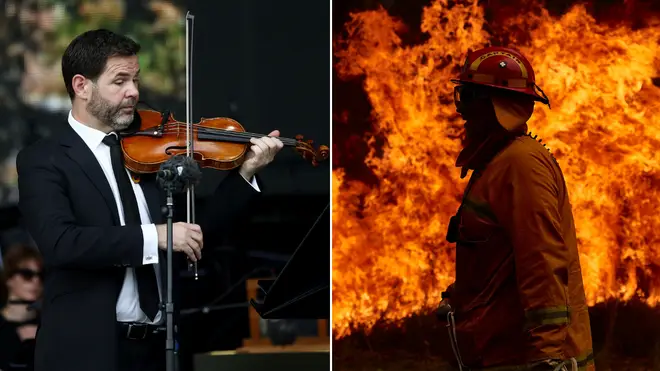On Air Now
Calm Classics with Myleene Klass 10pm - 1am
8 November 2021, 14:26 | Updated: 10 November 2021, 11:22

For the UN climate conference COP26, 15 orchestras around the world performed Vivaldi’s ‘The Four Seasons’, re-scored for a changing climate.
In 1723, Antonio Vivaldi composed one of the most famous pieces of music for violin and orchestra, The Four Seasons.
The violin concerto was split into four movements, each musically portraying a season; Spring, Summer, Autumn, and Winter.
However, how do the seasons which Vivaldi experienced, differ to those which we experience today due to almost 300 years of climate change?
This is what a group of composers, musicians, climate and computer scientists have worked together to find out, and the result is unnerving.
Read more: The world’s pioneering orchestras using classical music to respond to the climate crisis

Watch The [Uncertain] Four Seasons Trailer
To depict what a future world might look like with an additional 30 years of changes, the group has recomposed Vivaldi’s The Four Seasons using localised, worst-case scenario climate modelling for 2050.
“As part of the project, Vivaldi’s work has been rescored for every city in the world.” explains Tim Devine, the executive innovation director of design firm AKQA, which led the project in collaboration with agency Jung von Matt.
“Every variation is different. Each one jarringly altered from the harmony of Vivaldi’s original. In all variations, which can be listened to here, the changes are stark and irrefutable, illustrating the fact that if we do not act now, the landscape of 2050 will be dramatically changed from what we know and rely upon.”
The localised scores have been altered using a musical algorithm that incorporates the latest climate modelling for predicted changes in rainfall, biodiversity and extreme weather events in 2050, as laid out in the United Nations Intergovernmental Panel on Climate Change reports.
![The [uncertain] Four Seasons with Hugh Crosthwaite](https://imgs.classicfm.com/images/270237?crop=16_9&width=660&relax=1&format=webp&signature=OD-lqDQHBU3QYAZV1SDYJC8C7GE=)
On 5 November, 15 orchestras around the world, including the European Union Youth Orchestra and Cape Town Philharmonic, performed their localised Vivaldi recomposition.
Every performance can be watched on the The [uncertain] Four Seasons YouTube channel.
The aim of the performances, is to place further pressure on leaders to sign the Leaders Pledge for Nature and commit to reversing biodiversity loss by 2030.
Composer Hugh Crosthwaite says: “Vivaldi’s original composition was an innovation for its time, and his visceral translation of our relationship to nature into music continues to capture the imagination of audiences today.
“In that way, it’s the perfect canvas for us to communicate an urgent message about the environment: if we do nothing now, the harmonious environment we rely on for inspiration and nourishment will be forever changed.”
Read more: Inspiring a greener creative industry – music and the arts at COP26

European Union Youth Orchestra — Venice Var. Floating Autumn — The [uncertain] Four Seasons
You can also browse audio performances through an interactive world map on The [uncertain] Four Seasons website.
Some variations are unrecognisable to the original Vivaldi work. The first orchestra to launch the project was the Sydney Symphony Orchestra at the start of 2021 in a piece. Their Summer was depicted as an “anxiety-filled dream in a time where wildfires, food insecurity, and other disasters will become increasingly common”.
Other locations, such as the piece created for Shanghai, has no music written, as it is predicted the city will be under water by 2050.
“The [uncertain] Four Seasons is our way of telling the stories climate scientists drafted long ago. It’s a chance to feel what’s at stake at COP,” explains Devine.
“By reflecting the local risks of global warming in music we can help communities experience what a radically new aesthetic and lived experience might feel like and motivate them to place pressure on their local leaders to act now.”